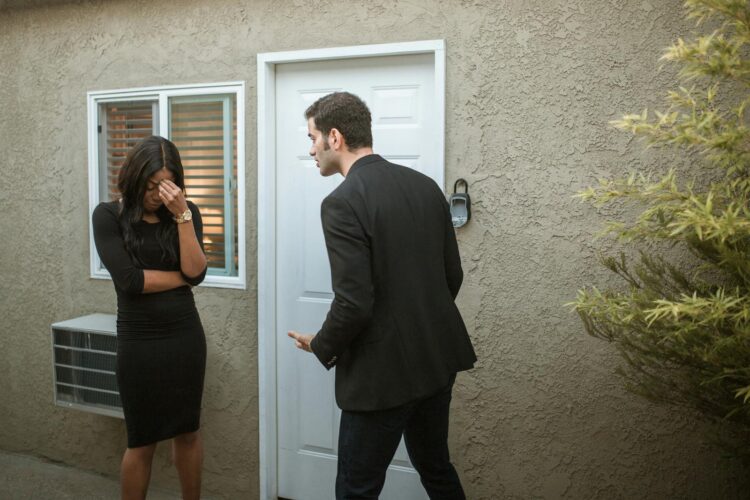
Leaving sounds simple on paper, but real life rarely works that way. People stay in unhappy relationships for reasons thatrun deeper than love. Fear, history, and practicality all tie them down, even when the spark is gone. Understanding these reasons doesn’t excuse misery — but it does explain why so many people find themselves stuck longer than they imagined.
Fear of Loneliness

Loneliness can feel heavier than unhappiness. Many people fear the silence of coming home to an empty house more than the tension of staying with someone who doesn’t make them happy anymore. They imagine holidays alone, birthdays with no one to celebrate, or evenings stretching endlessly without company. Even if the relationship has lost its joy, it still provides presence, and for some, that’s better than solitude.
Financial Dependence

Money can act like invisible handcuffs. Shared bills, joint mortgages, and children’s expenses make leaving not just emotional but logistical. Someone who earns less or nothing at all may feel trapped by dependence, worrying they won’t survive on their own. Even when love has faded, the thought of starting over financially can feel impossible. Many convince themselves that staying is “practical,” but it often means trading emotional well-being for financial stability.
Hope Things Will Change

Hope can be both beautiful and dangerous. People often stay because they believe things will get better — that the partner they fell in love with will return, or that problems are just a phase. Every apology, small improvement, or affectionate gesture reignites that hope. It becomes a cycle: hurt, healing, waiting, repeating. Hope becomes addictive, keeping people anchored in relationships that no longer serve them.
Fear of Starting Over

The thought of starting over is daunting. Re-entering the dating world, explaining your past, building trust with someone new — it can feel exhausting before it even begins. People stay because the idea of rediscovering themselves outside of the relationship seems overwhelming. Familiarity, even when unhappy, feels safer than the chaos of change. They tell themselves, “At least I know what I have here,” even if what they have doesn’t bring them joy.
Social Pressure

Relationships aren’t just private — they’re public. Families, friends, and even entire communities can weigh heavily onthe decision to leave. For some, divorce or breakups carry cultural or religious stigma, painting leaving as a failure. People worry about judgment: whispers at family gatherings, pity from friends, or questions they don’t want to answer. Social pressure convinces many that staying is the noble, respectable choice, even if misery is the cost.
Children

Children are one of the strongest reasons people stay, even when they’re deeply unhappy. Parents tell themselves that stability is more important than their own peace, believing kids are better off in a two-parent home. They fear that leaving will hurt their children, even if the current environment is tense or unloving. What often gets overlooked is that children absorb the atmosphere — they can sense conflict and unhappiness.
Comfort of Routine

Routine has a way of softening pain. Even when unhappy, the predictability of daily life can feel strangely comforting. Waking up next to the same person, sharing meals, repeating rituals — it creates a sense of normalcy. Breaking that rhythm means shaking up every corner of life, from mornings to weekends to holidays. For many, that disruption feels scarier than unhappiness itself. They cling to what they know, telling themselves that routine is stability, even if it’s slowly draining their spirit.
Guilt and Obligation

Guilt can be as binding as love. Some people stay because they don’t want to hurt their partner, or because they feel indebted after years of sacrifices and support. They replay moments where their partner was there for them and convince themselves that leaving would be betrayal. Obligation weighs heavily: promises made, vows spoken, families merged. Even when unhappiness takes over, they stay because walking away feels selfish.
Fear of Failure

Many people see the end of a relationship as a mark of personal failure. They tell themselves they didn’t try hard enough, or that quitting makes them weak. This mindset is especially strong for those who’ve built their identity around “making it work.” Pride holds them back, as if leaving means proving everyone who doubted them right. They would rather endure unhappiness than face the shame of feeling like they’ve failed.
Low Self-Esteem

When someone doesn’t believe they deserve better, they stop reaching for better. Low self-esteem convinces people that unhappiness is the price they have to pay, or that they’re lucky to have someone at all. They settle, thinking no one else would want them, or that they’d only find worse outside. The relationship may even reinforce those beliefs through neglect or criticism.
Emotional Investment

The past can be just as binding as the present. Years of shared memories, milestones, and sacrifices create a heavy sense of investment. People feel leaving means “throwing it all away.” They look back on trips, celebrations, and struggles they survived together, convincing themselves that those memories mean they must endure the unhappiness now. That emotional history becomes a trap, as though the time already spent is a debt that must be honored.
Fear of Hurting the Other Person

Leaving doesn’t just hurt the one leaving; it hurts the one left behind. Many people stay because they can’t stand the thought of breaking someone’s heart. They imagine the pain their partner will feel and choose to absorb unhappiness themselves instead. This form of self-sacrifice feels noble but slowly drains both people. Protecting someone else from pain becomes a reason to stay, even though the truth is, avoiding honesty often prolongs the hurt rather than spares it.
Belief That This Is Normal

When someone grows up surrounded by unhappy couples, like parents who argue constantly, or relatives who stay despite misery, they may believe that’s just how relationships are. Conflict, silence, or lack of intimacy feels “normal.” Without healthy models, they don’t question it. They tell themselves no relationship is perfect, and maybe this is as good as it gets. That belief, deeply rooted in their worldview, convinces them to stay, mistaking unhappiness for inevitability.
Fear of Judgment After Leaving

Leaving often shines a spotlight. People fear the questions: “Why now?” “Didn’t you try harder?” “Are you sure?” That scrutiny feels exhausting and invasive. They’d rather endure quietly than defend their decision to countless voices. Fear of being judged as selfish, impatient, or ungrateful convinces many to stay. Judgment from others becomes louder in their minds than the whispers of their own unhappiness, keeping them in place long after love has gone.
Denial of Unhappiness

Sometimes the hardest truth to face is your own. People stay because they aren’t ready to admit they’re unhappy. They downplay problems, compare themselves to worse couples, or tell themselves, “It’s just a rough patch.” Denial makes it easier to push forward day by day, even if it’s slowly draining them. The hardest step isn’t leaving — it’s admitting that happiness is already gone. Until they do, denial acts as a shield, keeping them stuck where they are.

